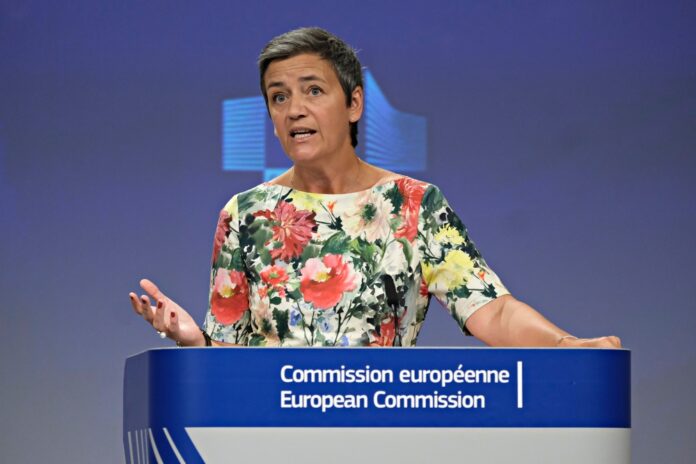Not everyone’s cup of IP
The European Commission has weighed up the issue of intellectual property rights in the mobile tech industry with one finger tilting the scale as its seeks a new process to set technology patent-licensing fee rates. This puts power of setting ‘fair’ licensing rates to the European Union Intellectual Property Office (EUIPO) in the hands of those will little experience in patents, reports TelecomTV which says the plan’s peer reviews, from industry experts, range from contentious to madness.
The EC wants to update the mobile intellectual property rights (IPR) sector by putting the European Union Intellectual Property Office (EUIPO) in charge. The setting and managing fair technology patent prices that this entails is currently managed between patent holders and their licensees or ruled upon in courts of law. The new regulation is set to be presented in draft form on 26 April (World Intellectual Property Day) by EC vice president Margrethe Vestager (pictured).
The patent-licensing sector is one of the axes on which the industry revolves around. It is worth billions and has very complex influence on the rest of industry. The fear is that if the EC regulation is passed, influential players could skew the market in a way that is not possible via the legal process and the value assigned to standard essential patents (SEPs) will be set at inappropriate rates.
A relatively small subset of the millions of tech patents granted are afforded standard essential patent (SEP) status. These catalyst are often of immeasurably far reaching consequence. Industry standards, like 5G or Wi-Fi, are covered by hundreds or even thousands of SEPs. Companies that hold SEPs charge a licensing fee that is often agreed by the patent holders and licensees based on fair, reasonable and nondiscriminatory (FRAND) terms. Such FRAND fees are usually determined by the fees charged for similar SEPs and sometimes also (or alternatively) determined by how many patents a company has developed (the strength of its patent portfolio). When there is a dispute over the fee being requested by the patent holder, the parties involved turn to the courts of law to determine a fair outcome.
There are regular court battles, often involving large technology product manufacturers that believe they should be paying less to use patented technology developed, in the case of the cellular technology sector, by the likes of Qualcomm (the market leader in wireless IPR revenues), Ericsson and Nokia. Sometimes Apple and Nokia have agreed a settlement but when Apple sought to improve its position with chipmaker Qualcomm through the courts, and when video and cellular patent-holder InterDigital fought Lenovo’s T&Cs lengthy and complex legal battles resulted, to great expense
The EC, though, thinks the process can be improved by handing the EUIPO the power to set fair royalties on SEPs (in a process taking no more than nine months) and then rule on any resulting disputes, with independent evaluators deciding on which patents are SEPs. The EUIPO-managed “procedure should simplify and speed up negotiations concerning FRAND terms and reduce costs,” noted the EC in the draft regulation document seen by Reuters. The draft regulation requires the EUIPO to compile a register of SEPs and get companies to sign up to the register if they want to charge patent fees or take legal action. The EC also wants patent-holders to come up with an “aggregate royalty” that can be charged for SEPs related to a standard.
The plan has been widely derided by those who follow the tech patents sector. Industry analyst Keith Mallinson , founder of research and consulting firm WiseHarbor, told TelecomTV the move is “extremely contentious”, as there are major question marks over whether imposing an aggregate royalty is desirable and even bigger question marks over deciding which, if any, body should have the power to administer such decisions, especially a body like the EUIPO that has no experience of dealing with SEP or FRAND issues. Its current role is to manage the EU trade mark and the registered European community design. ETSI already compiles and manages a technology patents database, said Mallinson.
It’s madness according to Joff Wild, the former editor in chief of intellectual property (IP) publication IAM and an IP consultant. “Giving so much responsibility to the EUIPO, which has not got any patent experience of any kind, is one hell of a call,”” Wild said on LinkedIn. “This looks like legislation that has been drafted after listening to one set of interests without giving even the slightest consideration to those of people who actually understand SEP licensing. I sense years of paralysis ahead.”
The EC’s Unified Patent Court (UPC), which was set up to arbitrate on patent cases, create legal certainty and encourage innovation, is only just getting up and running. “For years, the commission has been saying that the UPC system will be a gamechanger for Europe. Now, it seems to have decided that it does not trust the court or its judges to make the right calls about FRAND,” said Wild.
Florian Mueller’s Foss Patents blog concluded that the EC is: “putting a thumb on the scales only to the detriment of SEP holders.”



